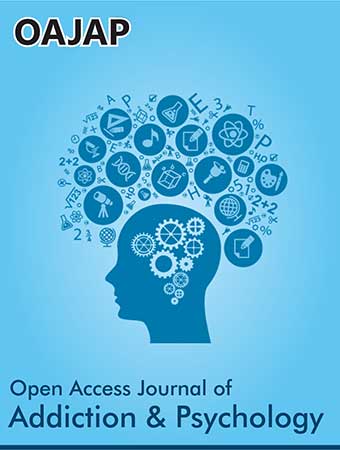 Opinion Article
Opinion Article
A Little Bit About Addiction
Scott Marley*
Division of Educational Leadership and Innovation, Arizona State University, United States
Scott Marley, Division of Educational Leadership and Innovation, Arizona State University, United States.
Received Date: March 29, 2023; Published Date: May 03, 2023
Introduction
Addiction is a complex condition that can be caused by various factors, including biological, psychological, and social influences. The exact cause of addiction is not yet fully understood, but it is believed to be a combination of genetic predisposition, environmental factors, and individual choices. People can become addicted to various substances, such as drugs and alcohol, or behaviors, such as gambling and shopping. Addiction can be caused by changes in the brain’s reward system, leading to intense cravings and a compulsive desire to engage in the addictive behavior. Additionally, addiction can be linked to underlying mental health conditions, such as anxiety and depression, which can drive individuals to seek relief through addictive substances or behaviors. Overall, addiction is a complex issue that can be caused by a variety of factors, and effective treatment often requires a multifaceted approach that addresses the underlying causes and helps individuals to manage cravings and develop healthier coping mechanisms.
Prevention of Addiction
Preventing addiction involves a combination of individual and societal efforts. Here are some strategies that can help prevent addiction: (1) Education and Awareness: Educating individuals about the risks associated with substance abuse and addiction can help prevent them from developing an addiction. Raising awareness about the dangers of addiction can also help reduce the stigma associated with seeking help; (2) Positive Coping Mechanisms: Encouraging individuals to develop healthy coping mechanisms, such as exercise, mindfulness, and social support can help prevent them from turning to drugs or other addictive behaviors in response to stress; (3) Early Intervention: Early detection and treatment of mental health disorders and substance abuse problems can prevent them from developing into full-blown addiction; (4) Limiting Access to Addictive Substances: Policies such as age restrictions on purchasing addictive substances, limiting the number of prescriptions for opioids, and enforcing laws against drug trafficking can help limit access to addictive substances; (5) Supportive Communities: Building supportive communities, including peer support groups, can help individuals struggling with addiction to feel less isolated and more motivated to seek help; (6) Strong Support Network: Having a strong support network can help individuals stay on track with recovery and avoid relapse. Prevention efforts should focus on reducing risk factors for addiction, promoting healthy behaviors and coping mechanisms, and providing support for individuals struggling with addiction or mental health problems.
Treatment of Addiction
Addiction is a complex and chronic condition that requires a multifaceted treatment approach. Here are some common treatment options for addiction. The first step in treating addiction is often detoxification, which involves safely managing the withdrawal symptoms that occur when an individual stops using drugs or alcohol. Behavioral therapy is a cornerstone of addiction treatment and can include approaches such as cognitive-behavioral therapy, motivational interviewing, and contingency management. Behavioral therapy helps individuals to identify and change unhealthy patterns of thinking and behavior that contribute to addiction. Medications can be used in combination with behavioral therapy to help reduce cravings and withdrawal symptoms. Examples include methadone, buprenorphine, and naltrexone. Support groups such as Alcoholics Anonymous and Narcotics Anonymous can provide individuals with a sense of community, accountability, and support during recovery. Dual diagnosis treatment addresses co-occurring mental health disorders, such as depression or anxiety, that can contribute to addiction and hinder recovery. Holistic therapies, such as yoga, meditation, and acupuncture, can help individuals to manage stress and develop healthy coping mechanisms. Successful treatment for addiction often involves a combination of these approaches tailored to the individual’s specific needs and circumstances. The goal of treatment is not only to help individuals achieve and maintain sobriety but also to improve their overall quality of life.
Conclusion
Addiction is a complex issue that can be caused by a variety of factors, and effective treatment often requires a multifaceted approach that addresses the underlying causes and helps individuals to manage cravings and develop healthier coping mechanisms. Prevention efforts should focus on reducing risk factors for addiction. Treatment can help individuals achieve and maintain sobriety while improving their overall quality of life.
Acknowledgement
None.
Conflict of interest
Author declared no conflict of interest.
-
Scott Marley*. A Little Bit About Addiction. Open Access J Addict & Psychol 7(1): 2023. OAJAP.MS.ID.000655.
Addiction; Drugs; Substance Abuse; Alcohol; Drug presence; Behaviors; Gambling; Addictive substances; Mental health conditions; Mental health disorders
-

This work is licensed under a Creative Commons Attribution-NonCommercial 4.0 International License.






